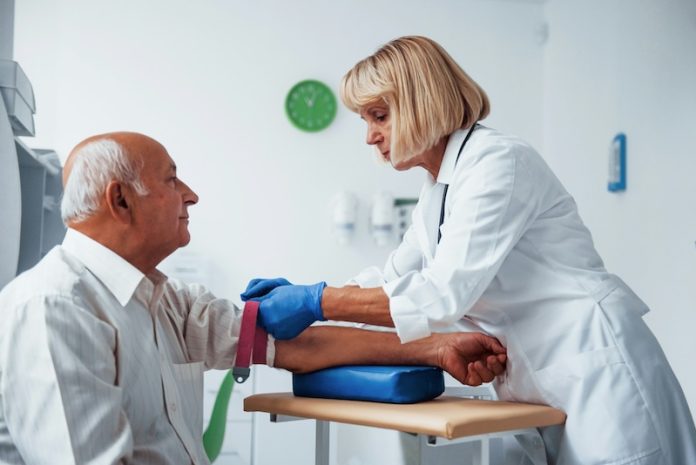
Routine blood tests might help diagnose cancer faster in people with stomach pain or bloating, according to a study led by researchers at UCL.
Many people visit their GP with these symptoms and often get blood tests.
However, it’s unclear how well these tests can predict cancer risk.
The study, published in PLOS Medicine, analyzed data from over 400,000 people aged 30 and older in the UK who visited a GP for stomach pain and more than 50,000 for bloating. About two-thirds of these people had blood tests after their appointments.
Researchers found that abnormal results in 19 common blood tests were linked to a higher risk of being diagnosed with cancer within a year.
They estimated that if these abnormal results were considered, there would be a 16% increase in the number of undiagnosed cancer patients given an urgent referral, compared to assessments based only on symptoms, age, and sex.
This means an additional six people with undiagnosed cancer would be urgently referred out of 1,000 people who visited the GP with stomach pain or bloating, on top of the 40 people already being referred without using blood test results.
Dr. Meena Rafiq, from the UCL Department of Behavioral Science & Health, said, “Our study suggests we can improve cancer detection with blood tests that are already available and routinely given to patients with unclear symptoms.
This could be an efficient, affordable way to improve early cancer diagnosis and increase the likelihood of successful treatment.”
Dr. Rafiq pointed out that it might be challenging for GPs to interpret a range of blood test data, highlighting the need for an automated tool to assess cancer risk based on multiple variables.
The study used anonymized patient data from the Clinical Practice Research Datalink (CPRD), collected from GP practices across the UK between 2007 and 2016.
The researchers found that 2.2% of people who reported stomach pain to their GP were diagnosed with cancer within a year, and the same percentage applied to those who reported bloating.
In the UK, guidelines from the National Institute for Health and Care Excellence (NICE) recommend an urgent cancer referral if a person’s risk is higher than 3%.
The study found that people aged 60 or over who went to the GP with stomach pain or bloating had a high enough risk to warrant an urgent cancer referral, regardless of blood test results.
Currently, over-60s with these symptoms are only referred if they have another potential cancer signal like weight loss.
The study estimated the cancer risk for men in their 60s reporting stomach pain to be 3.1%, rising to 8.6% for men in their 80s. For women in these age groups, the risk was 3.1%, rising to 6.1%.
The researchers cautioned that the cancer incidence was likely higher in the study sample than among a broader group of people experiencing stomach pain or bloating who might not go to their GP or have blood tests.
In people aged 30 to 59 with stomach pain or bloating, certain blood test results, like anemia, low albumin, raised platelets, abnormal ferritin, and increased inflammatory markers, strongly predicted undiagnosed cancer risk.
For instance, in women aged 50 to 59 with abdominal bloating, the pre-blood test cancer risk of 1.6% increased to 10% with raised ferritin, 9% with low albumin, 8% with raised platelets, 6% with raised inflammatory markers, and 4% with anemia.
Currently, only raised platelets and anemia are included in cancer referral guidelines, which focus on ‘alarm’ symptoms and single organ cancer risk, with limited guidance for vague symptoms that could indicate cancer in different organs.
Dr. Rafiq added, “Half of all people with undetected cancer will first see a doctor with vague symptoms that are hard to diagnose. Many of these patients undergo routine blood tests that could help identify those most likely to have cancer and should be prioritized for referral.”
The study also showed the most common cancers for people with these symptoms varied by age and sex. Overall, bowel cancer was the most common, followed by prostate and pancreatic cancer in men, and breast and ovarian cancer in women.
The researchers noted that their findings on the predictive value of blood tests for cancer might not apply to other health systems with different blood test usage rates.
If you care about cancer risk, please read studies that exercise may stop cancer in its tracks, and vitamin D can cut cancer death risk.
For more information about cancer, please see recent studies that yogurt and high-fiber diet may cut lung cancer risk, and results showing that new cancer treatment may reawaken the immune system.
The research findings can be found in PLoS Medicine.
Copyright © 2024 Knowridge Science Report. All rights reserved.



